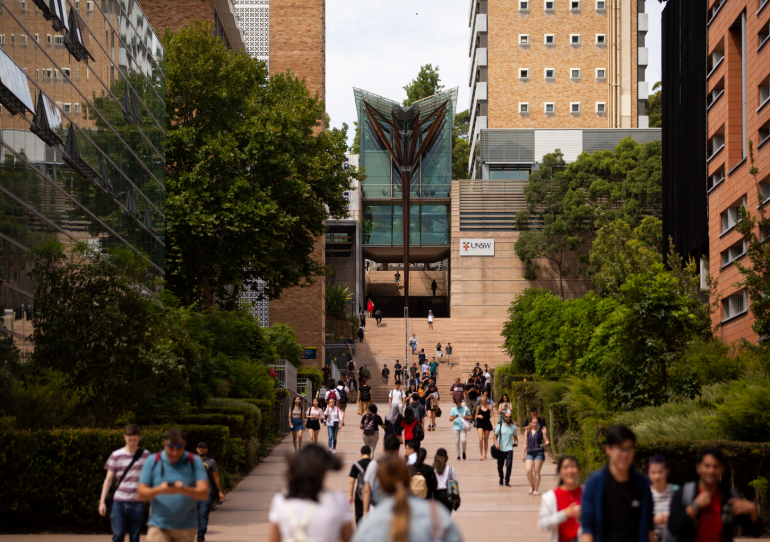UNSW Sydney academics from a diversity of disciplines have been named Future Fellows by the Australian Research Council (ARC). The group of eight researchers secured more than $7 million in funding for projects ranging from developing eco-friendly textiles to predicting drought impacts on Australian ecosystems.
Under the 2023 ARC Future Fellowships scheme, 100 Future Fellows across Australia will share in more than $97 million in grants.
The ARC Future Fellowships scheme facilitates research excellence by supporting outstanding midcareer researchers to undertake high quality research in areas of national and international benefit. The Fellowships honour the recipients’ dedication, hard work, high-quality research, and leadership ability.
“It's wonderful to see the breadth of topics that will be explored in this round of the Future Fellowships scheme,” ARC Chief Executive Officer, Judi Zielke, said.
UNSW Professor Dane McCamey, Pro Vice-Chancellor, Research, congratulated the academics on being recognised for their research and outstanding contributions across a broad range of topics.
“We are very proud of the many UNSW researchers who were awarded Future Fellowships,” Prof. McCamey said.
“From projects looking to predict drought impacts on Australian ecosystems to exploring why women are at an increased risk for death and serious injury in motor vehicle crashes compared to men, it’s impressive to see the potential for positive societal impact within the eight UNSW projects announced in this round of ARC Future Fellowships.”
Read more: ARC names 14 UNSW researchers as 2022 future fellows
UNSW’s successful applicants are:
Dr Murad Tayebjee, UNSW Engineering, has received $1,001,386 for a project focused on studying organic optoelectronics, which are technologies used in mobile phones, televisions, low-energy-lighting and solar cells. This will improve knowledge about organic semiconductors, enhance Australian research capacity and international collaboration and help train students and early-career researchers.
Dr Jin Zhang, from UNSW Engineering, has received $939,401 to develop battery-free, eco-friendly textiles with self-powered sensors that are more efficient, comfortable, and hard-wearing than predecessors. This will provide significant benefits by offering an attractive renewable energy source for driving low power sensors and opening new opportunities in healthcare, sports, virtual reality, and smart homes.
Dr Yi Lu, from UNSW Engineering, has received $919,906 to reduce the uncertainties in characterising and predicting drought impacts on Australian ecosystems. This research focuses on understanding how vegetation responded to hydro-meteorological conditions from the onset to termination stages during Australian droughts in the past 40 years, by investigating the newly developed first global long-term vegetation water content record from satellites. This will provide significant benefits in developing drought mitigation strategies for national agricultural production and water resource allocation.
Dr Ali Jalili, from UNSW Engineering, has received $842,080 to develop scalable technology for production of fertilisers using renewable energy, air, water, and captured CO2. The outcomes of this project will be to increase the capacity to adopt low-cost and decentralised methods for renewable energy utilisation and decarbonisation of the Australian agriculture sector. This will provide substantial technological capacity that can be applied to other clean energy sectors including Australia's developing hydrogen transport economy.
Dr Wenxian Li, from UNSW Science, has received $828,410 to address the limitation of current water electrolysis technologies for renewable energy generation with high efficiency. This will provide significant benefits, such as low energy consumption and low carbon dioxide emissions in hydrogen production and advanced manufacturing, to further advance renewable energy technology and sustainable development.
Professor Julie Brown, from UNSW Medicine & Health, has received $1,089,921 for research exploring why women are at increased relative risk for death and serious injury in motor vehicle crashes compared to men. This will establish what population groups have good and poor access to the best vehicle safety technologies, the differences, and what might cause these differences in the benefits of vehicle safety technology between women and men. The outcomes of this project will be of use to academics, policy makers and industry designing new ways to protect women in crashes and close this gender gap.
Professor Petr Sedlacek, from UNSW Business, has received $1,108,598 to reshape thinking about business dynamism, its drivers, and how it impacts the economy from sources of long-run productivity growth to how climate risks impact business dynamism. The delivered facts and models will aid policy design for reviving business dynamism, underpinning societal and economic gains.
Associate Professor Jessica Whyte, from UNSW Arts, Design & Architecture, has received $1,068,547 to investigate the post-Cold War proliferation of economic sanctions. It draws on research to understand how liberal policies have come to view economic sanctions as non-violent tools of diplomacy. By analysing the moral, political, and economic theories that inform the imposition of sanctions, the research will throw new light on a crucial dimension of international politics.
